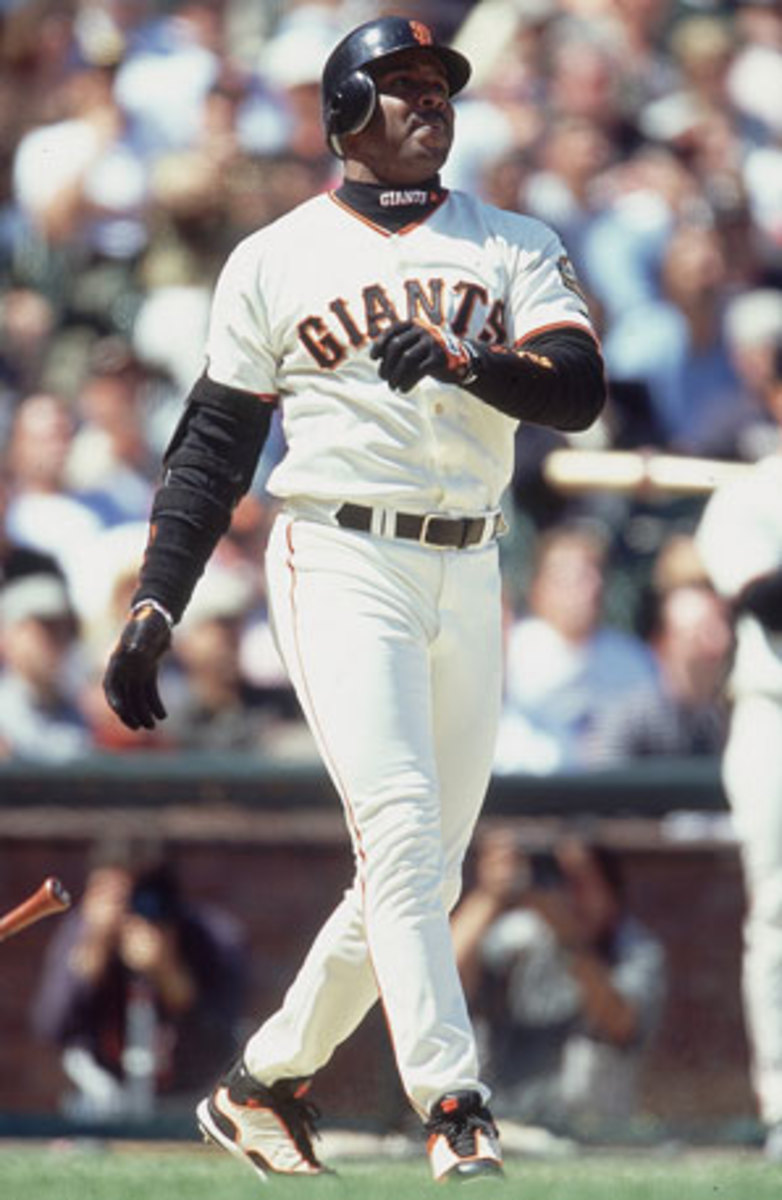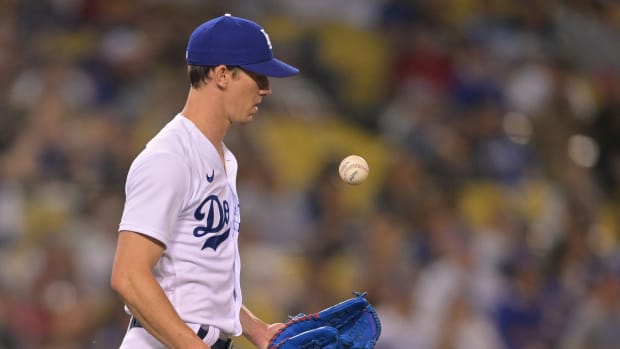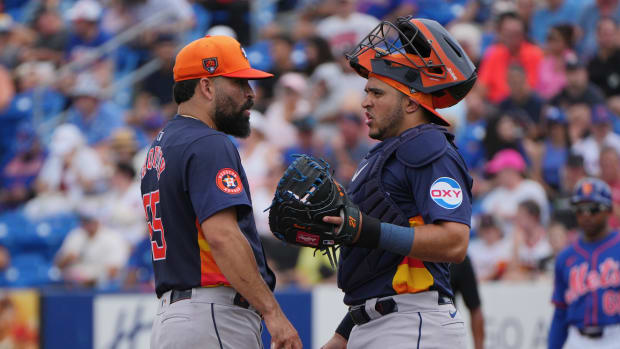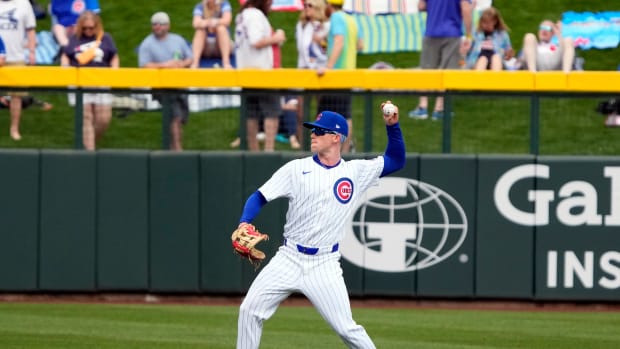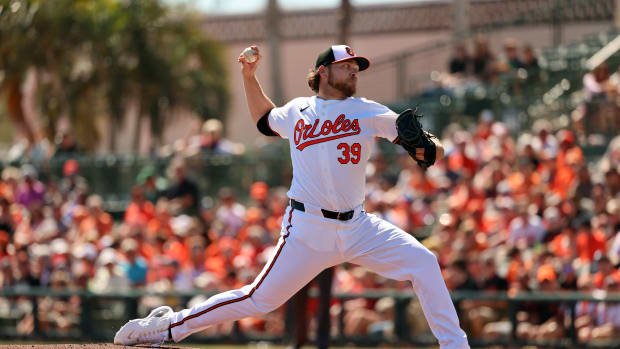No easy answers for Hall of Fame debate
Barry Bonds stopped playing baseball five years ago, but we can still keep screaming about him. Bonds is on the Hall of Fame ballot this year, which means he is guaranteed to tick off millions of people no matter what happens. This may be the most Barry Bonds moment of Bonds' life.
I love a good Hall of Fame debate, and Bonds is one of many on this year's ballot. From 1986 to 1998 he was a Hall of Fame player -- he hit .290 with 411 home runs, a .411 on-base percentage and .556 slugging percentage, and this was largely before baseball's homersplosive scoringpalooza. He was also a phenomenal defensive leftfielder.
Then Bonds' whole body got a lot bigger, including his head, and he famously attributed it under oath to flaxseed oil. Dude, if flaxseed oil did that, millions of men would apply it instead of taking Viagra. Bonds, of course, was using performance-enhancers. We all know that now. His numbers went from Hall of Fame to Hall of Ridiculous -- from 1999 to 2007, he had an OPS of 1.217, or 20 percent higher than a typical MVP season.
So how should sportswriters vote for Bonds on their ballot?
A. Yes, vote him in. He was a Hall of Famer before he juiced, and anyway, a lot of guys juiced.
B. No, keep him out. He sullied the game, he destroyed its soul, he brought shame to our nation and probably brought the Great Recession upon us all.
I bet most people can pick either A or B. And I bet most people can reach a conclusion on Roger Clemens, who basically has the same resume of achievements and accusations: Clemens was an all-time great, then he started using performance-enhancers late in his career, then he put up numbers that were obscenely great for an elderly fellow. Clemens has denied juicing, and of the billions of people in the world, at least six believe him. But Clemens should get almost the exact percentage of the vote that Bonds gets. They are two versions of the same case.
While you think about those two, consider the candidacy of Sammy Sosa. From 1989 to 1997 he didn't get on base that much, and didn't even hit the ball that much, but when he did, he hit it really far, often out of the ballpark. His nickname was Sammy So-so, which was a cheap shot, but it had the ring of accuracy.
Then came 1998, baseball's Summer of Love, which was like music's Summer of Love, in that drugs where everywhere but hey, the world is so pretty! Sosa hit 66 home runs. Yes! In one year! Can you believe it? The next year he hit 63. Over a five-year stretch, he averaged 58 home runs and 141 RBIs. He was Roger Maris on auto-repeat.
How did he possibly do this? Well, in 2003, Major League Baseball started testing its players, as a trial, and promised the results would remain "anonymous." In 2009 the New York Times reported that Sosa had failed his "anonymous" test. He has not confirmed that, and MLB cannot confirm that, because the result was "anonymous," after all. But in 2004, when drug testing became real instead of "anonymous," Sosa's numbers dropped dramatically.
How should sportswriters vote for Sosa on their ballot?
A. Yes. He hit 609 home runs, and even if he did fail his "anonymous" test, it was supposed to be anonymous, it doesn't prove he was juicing in his best years. Besides, PEDs were part of the era, and he was a Hall of Famer in that era.
B. No. He was a professional fraud.
While you ponder that one, turn to former Dodgers and Mets catcher Mike Piazza. Many people view Piazza as the best hitting catcher ever, but this opinion is disputed by people who actually saw him catch. They say Piazza was not a catcher at all, but a natural first baseman who happened to crouch behind the plate. I bet more people said "That guy should not be a catcher!" about Piazza than about any catcher in major-league history. I don't think it's close, actually
Anyway, Piazza had Hall of Fame hitting numbers by almost any measure, for almost any position: .307 batting average, .377 on-base percentage, .545 slugging percentage, 427 home runs, 1,335 RBIs. And if anything, those numbers don't show you how good he was, because he played most of his career in Dodger Stadium, which is a haven for pitchers, and Shea Stadium, which was not a haven for any living creatures, but favored pitchers more than hitters.
Piazza's career OPS at home was .880. On the road it was .960. He may have been a lousy catcher -- he WAS a lousy catcher -- but he was still a catcher, and a man putting up those kinds of offensive numbers while playing catcher is extremely valuable.
Did Piazza use performance-enhancing drugs? Well, he never tested positive, as far as I can tell. He was not named in the Mitchell Report. He did not spend offseasons at Jose Canseco's house on Mars.
But he is a suspect. Why? A few reasons. He was never supposed to be a major leaguer, let alone a star -- the Dodgers drafted him in the 62nd round as a favor to their manager, Tommy Lasorda, who knew Piazza's father for many years. In his first minor-league season, Piazza hit .268. The next year he hit .250 in Single-A ball without much power. He was one of the worst everyday players on his own team.
Three years later, Piazza hit .318 with 35 home runs in the National League.
As others have noted, he apparently had visible acne on his back, often a sign of steroid use. And once baseball started preliminary drug testing in 2003 and real drug-testing in 2004, Piazza's power dropped. His slugging percentage went from .544 to .483 to .444. Of course, he was older then, and he did have a bounce-back year with the Padres in 2006, though nobody remembers this. (Nobody = me.)
How should sportswriters vote for Piazza on their ballot?
A. Yes
B. No.
I think the answer to the Piazza question -- and ultimately, to all these questions -- is pretty clear:
C. None of the above.
* * *
As I have written before, I do not think sports journalists should be deciding who gets into Baseball's Hall of Fame.
I think our participation is great for the Hall of Fame -- we have our flaws, but we are the only people who are paid to study baseball up-close, objectively. We talk to players, coaches and executives, we study old and new statistics (or should) and we are often more aware of differing views on a player than people inside the game are. We get to look inside and outside the bubble. I can't say we are all completely unbiased, but certainly our biases are not as strong as they would be if, say, we played second base for the Atlanta Braves.
Plus, we provide endless publicity for the Hall of Fame simply by writing and talking about our votes. I'm not even eligible for a vote yet, and I'm writing that sportswriters shouldn't be voting ... and even I am providing publicity for the Hall of Fame right now.
But this is simply not our job. The Baseball Hall of Fame is a promotional arm of the game we cover. It is widely viewed as a verdict on a player's career: A player who makes the Hall of Fame is an all-time great, and a player who falls short is ... just short of being an all-time great.
I don't think we should be the ones to render that verdict. But I have many friends who disagree with me, and I suppose you could argue that these players are all retired, we're not covering them anymore, and I'm making too big a deal of this, and it is in fact our journalistic OBLIGATION to tell the world who belongs in the Hall of Fame and who does not.
I think the real reason writers think we should vote for the Hall of Fame is that ... it's really cool to vote for the Hall of Fame.
But put that aside for a second.
How can we possibly make these decisions now? How can we decide if Mike Piazza is Hall of Fame-worthy? How can we make that decision about Jeff Bagwell, who is a suspect but hasn't really been accused by anybody credible?
What do we make of Gary Sheffield, who acknowledged accidentally using performance-enhancers when he worked out with Bonds, but who probably hit most of his 509 home runs without them? (Sheffield in 1992, long before anybody thinks he used PEDs: .330 batting average, 33 home runs, .580 slugging percentage, 168 OPS+. Sheffield in 2004, the first year of drug testing that counted: .290 batting average, 36 home runs, .534 slugging percentage, 141 OPS+.)
We're drawing lines in the dark.
We don't have nearly enough evidence to reach these kinds of conclusions. People have such a hard time admitting that. In my days of listening to sports talk-radio, two things I never heard were "I don't know" and "Neither do I." We're all supposed to have opinions and express them as loudly as we can.
Throwing your hands up and walking away is not easy. But it's the right thing to do.
There is simply no way to keep Piazza or Bagwell out of the Hall of Fame based on what we know. And that is not a defense of either -- for all I know, they hid needles inside their bats. I'm just saying we don't have enough evidence. In the case of Piazza, we don't have any evidence at all. We're just guessing, and even if it turns out to be an accurate guess, then it was still a guess.
Voters can try to make the guesses seem more educated than they are. They can examine this thoroughly and come up with a series of guidelines. But that is harder than it sounds.
Voters can say, "I refuse to vote for anybody directly connected to PEDs." But then they will say no to Bonds and Clemens and yes to guys who were not as good as Bonds or Clemens in Bonds' and Clemens' pre-PED days.
Voters can say, "I refuse to vote for anybody I suspect." But again, how is that fair? What if Piazza or Bagwell never used PEDs? Why should they be punished?
Voters can say, "I won't let suspicions cloud my vote. If there is no evidence, then I ignore the PED issue and vote based on performance." But once a player is in the Hall, he can't be removed. Or at least, there is no precedent for it. And not all "evidence" is the same. We have evidence that Bonds, Rafael Palmeiro, Mark McGwire, Sosa and Sheffield used PEDs. But the quality and quantity of that evidence varies greatly.
I suspect that, over time, voters will realize the folly of all this, and more and more of them will vote for players solely on performance, even if they have clear proof that the player used PEDs. That's one solution. A better one is to admit that some questions have no answer. Who deserves to get into the Baseball Hall of Fame? I don't know. And neither do you.






























